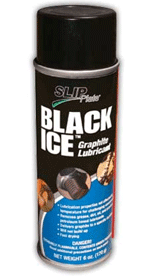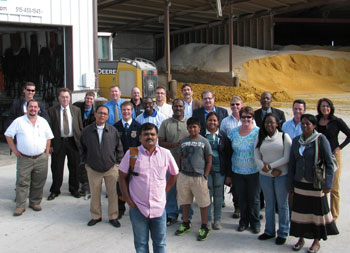 A group of 17 farmers from Canada, Honduras, India, Mexico, New Zealand, Philippines, South Africa, Swaziland, United Kingdom, Uruguay, US, Zambia, and Zimbabwe had the chance to visit a livestock operation with an ethanol plant next door.
A group of 17 farmers from Canada, Honduras, India, Mexico, New Zealand, Philippines, South Africa, Swaziland, United Kingdom, Uruguay, US, Zambia, and Zimbabwe had the chance to visit a livestock operation with an ethanol plant next door.
The annual Global Farmer Roundtable, organized by Truth About Trade & Technology (TATT), makes Couser Cattle Company a regular stop for the international farmers each year. TATT Chairman Emeritus Dean Kleckner, former president of the American Farm Bureau Federation, is a big supporter of ethanol himself. “I’m a believer in ethanol from corn,” said Kleckner during an interview at World Food Prize, where the roundtable is held each year. “The corn that is used for ethanol, a lot of that comes back to farmers in the form of distillers grains.”
Couser Cattle Company owner Bill Couser was instrumental in starting the farmer-owned Lincolnway Energy ethanol plant in Nevada, Iowa, which is located next to his operation so he can take full advantage of using distillers grains as feed for his livestock.



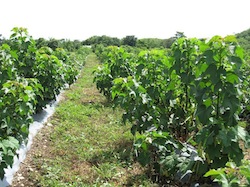
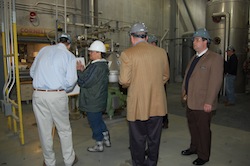


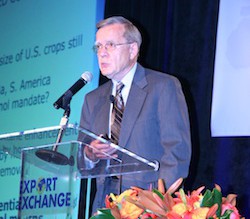


 The estimated sales price for the facilities and certain related working capital is $133.1 million, including the assumption at closing of term debt of approximately $28.3 million. In addition, the Company expects to realize net proceeds from the liquidation of retained working capital of approximately $86.7 million before the repayment of approximately $85.2 million under a revolving credit facility and inventory financing arrangements. Working capital and amounts outstanding under debt and inventory financing arrangements are based on September 30, 2012 balances and will be adjusted to final amounts at closing. Net cash proceeds, including working capital liquidation, are expected to be approximately $103.8 million.
The estimated sales price for the facilities and certain related working capital is $133.1 million, including the assumption at closing of term debt of approximately $28.3 million. In addition, the Company expects to realize net proceeds from the liquidation of retained working capital of approximately $86.7 million before the repayment of approximately $85.2 million under a revolving credit facility and inventory financing arrangements. Working capital and amounts outstanding under debt and inventory financing arrangements are based on September 30, 2012 balances and will be adjusted to final amounts at closing. Net cash proceeds, including working capital liquidation, are expected to be approximately $103.8 million.
